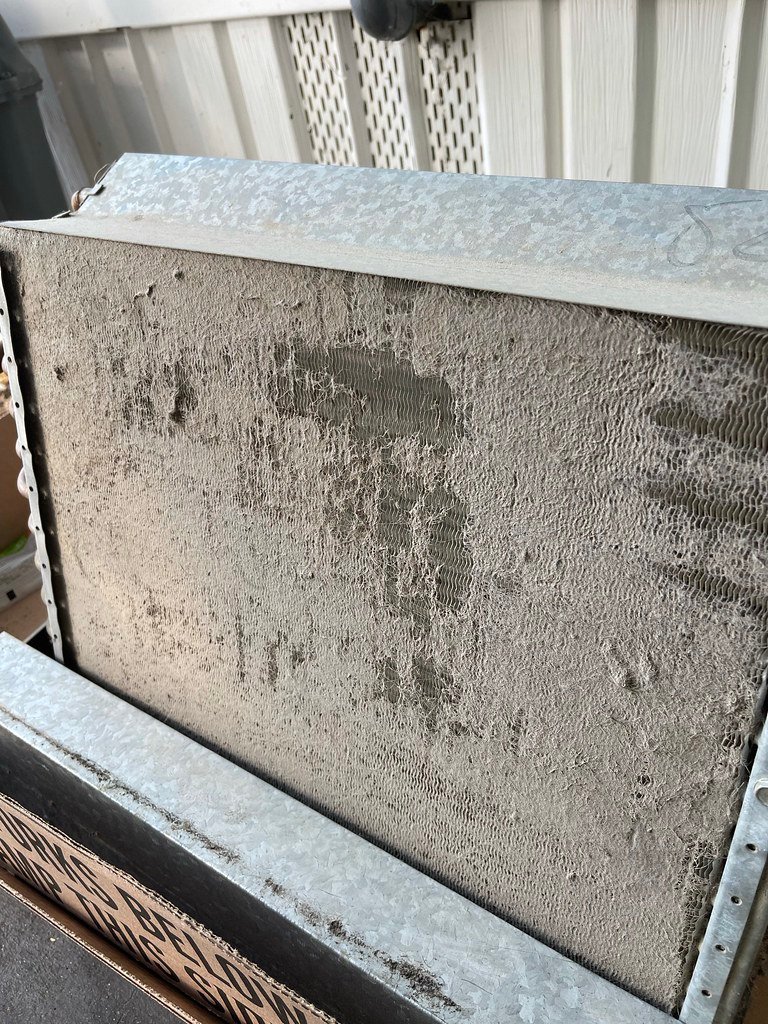Musty and unpleasant odors emanating from your HVAC system can be more than just a nuisance; they can also indicate underlying issues that need prompt attention. Whether it’s a musty smell, a scent reminiscent of rotten eggs, or even an ammonia-like odor, these smells are often symptomatic of problems that can affect both your comfort and health. In this comprehensive guide, we will delve into understanding the root causes of these odors, how to identify them, and effective strategies to eliminate them from your HVAC system.
Understanding Musty Odors From HVAC Smell
Musty odors in your HVAC system are typically the first sign that something is amiss. These smells often indicate the presence of mold or mildew, which can thrive in the moist, dark environment inside your AC unit. When you turn on your air conditioner, these spores can get distributed throughout your home, leading to an unpleasant atmosphere.

Recognizing the musty smell is crucial. It’s often described as a damp, earthy odor, similar to the scent you might encounter in a damp basement or after a rainstorm. This smell means that there is excessive moisture somewhere within your HVAC system, which could be due to various factors such as leaks, condensation, or inadequate ventilation.
Addressing these odors promptly is essential not only for maintaining a pleasant indoor environment but also for preventing potential health risks. Mold and mildew can exacerbate allergies, respiratory issues, and other health problems, making it imperative to tackle the issue head-on.
Common Causes of Musty Smell in AC Units
One of the most prevalent causes of musty smells in AC units is the accumulation of moisture. Water can collect in various parts of the HVAC system, including the drip pan, coils, and ductwork. When this water stagnates, it creates a breeding ground for mold and mildew.
Another common culprit is dirty or clogged air filters. Over time, these filters can become laden with dust, debris, and organic matter, which can contribute to mold growth. Regularly replacing your air filters can help mitigate this problem and improve your system’s efficiency.
Lastly, inadequate ventilation can also lead to musty odors. If the air isn’t circulating properly, it can create pockets of stagnant air within your home and HVAC system. Ensuring that your system has adequate airflow can help prevent these smells from developing.
How to Identify Mold in AC: Key Signs
Identifying mold in your AC system is crucial for addressing the root cause of musty odors. One of the most apparent signs is the musty odor itself, but there are other indicators to be aware of. Visible mold growth on any part of your HVAC unit, such as coils or drip pans, is a clear indication that mold is present.
Another key sign is the development of allergy-like symptoms among your household members. Mold spores can trigger respiratory issues, sneezing, coughing, and other allergy symptoms. If these symptoms worsen when the AC is on, mold may be the culprit.
Finally, increased humidity levels in your home can also signal mold growth in your HVAC system. If you notice that your home feels more humid than usual, it might be time to inspect your AC unit for mold. Using a hygrometer can help you monitor indoor humidity levels and take action when necessary.
Why A Central AC Produces Unpleasant Smells
Your central AC unit can produce a variety of unpleasant smells, each indicating different underlying issues. For instance, a burning smell often signals electrical problems, such as overheating wires or components. This is a serious issue that requires immediate professional attention.
A rotten egg smell is typically associated with a natural gas leak, which is dangerous and necessitates urgent intervention. If you detect this odor, it’s crucial to shut off your gas supply and contact your gas company immediately.
A smell reminiscent of dirty socks or stale water often indicates mold or mildew within your HVAC system. This could be due to a clogged drain line, dirty coils, or stagnant water in the drip pan. Addressing these issues can help eliminate the musty smell and improve your indoor air quality.
Addressing Moisture Smell from HVAC Vents
Moisture smells from HVAC vents are commonly caused by condensation within the ductwork. This can occur when the air passing through the ducts is too cold, causing water vapor to condense and accumulate. Ensuring proper insulation of your ducts can help prevent this problem.
Leaky ducts can also contribute to moisture smells. When ducts are not properly sealed, they can allow warm, humid air to enter, leading to condensation and mold growth. Sealing any leaks and ensuring that your ductwork is in good condition can help mitigate these odors.
Regular maintenance of your HVAC system, including cleaning and inspecting the ductwork, can go a long way in preventing and addressing moisture smells. Scheduling annual inspections with a professional can help identify potential issues before they become major problems.
AC Smells Like Rotten Eggs, Vinegar, or Pee: Why?
Different odors from your AC unit can signify various underlying issues. A rotten egg smell typically indicates a natural gas leak, which is a serious safety hazard. If you detect this smell, evacuate your home and contact your gas company immediately.
A vinegar-like smell can be caused by the growth of bacteria or mold within your HVAC system. This smell is often described as sharp and acidic. Cleaning or replacing the affected components, such as air filters and coils, can help eliminate this odor.
An ammonia-like smell, similar to pee, is often due to the buildup of bacteria in the AC system. This can occur when there is stagnant water in the drip pan or when the drain line is clogged. Regular cleaning and maintenance can help prevent these bacteria from proliferating and causing unpleasant odors.
Step-by-Step Guide to Eliminate Musty Odors
- Inspect and Clean Air Filters: Start by checking your air filters and replacing them if they are dirty or clogged. Clean filters can improve air quality and reduce mold growth.
- Clean Coils and Drip Pans: Use a mixture of water and mild detergent to clean the coils and drip pans. Removing any buildup can help prevent mold growth.
- Ensure Proper Drainage: Check the drain line for clogs and ensure that it is draining properly. A clogged drain line can lead to water accumulation and mold growth.
- Seal Leaky Ducts: Inspect your ductwork for leaks and seal any gaps with duct tape or a sealant. This can help prevent warm, humid air from entering and causing condensation.
- Improve Ventilation: Ensure that your HVAC system has adequate airflow by opening vents and using fans to circulate air. Proper ventilation can help prevent musty odors from developing.
- Regular Maintenance: Schedule annual inspections and maintenance with a professional HVAC technician. Regular upkeep can help identify and address potential issues before they become major problems.
Preventative Measures to Keep Your HVAC Smelling Fresh
Taking preventative measures can help keep your HVAC system smelling fresh and functioning efficiently. Regularly replacing air filters is one of the simplest and most effective ways to maintain good air quality and prevent mold growth.
Ensuring proper ventilation is also crucial. Make sure that air can circulate freely throughout your home and that your HVAC system is not obstructed by furniture or other items. Using fans and dehumidifiers can also help maintain optimal humidity levels.
Lastly, scheduling regular maintenance with a professional HVAC technician can help identify and address potential issues before they become major problems. Annual inspections and cleanings can go a long way in keeping your HVAC system in top condition and free of unpleasant odors.
FAQ: Everything About HVAC Odor Problems
How do I get my AC to stop smelling musty?
Start by inspecting and cleaning the air filters, coils, and drip pans. Ensure proper drainage and seal any leaks in the ductwork. Improving ventilation and scheduling regular maintenance can also help eliminate musty odors.
Why does my HVAC smell musty when I turn it on?
A musty smell when you turn on your HVAC system is typically caused by mold or mildew growth due to moisture accumulation. This can be addressed by cleaning the system and ensuring proper ventilation and drainage.
What does mold in AC smell like?
Mold in your AC system often produces a musty, damp, earthy odor, similar to the smell of a damp basement or after a rainstorm. This odor is a clear indication of mold growth and should be addressed promptly.
Why does my central AC smell bad?
Unpleasant smells from your central AC can be due to various factors, including mold or mildew growth, dirty air filters, clogged drain lines, or electrical issues. Identifying the source of the odor is essential for effective remediation.
Why is there a moisture smell from my HVAC vent?
A moisture smell from your HVAC vent is usually caused by condensation within the ductwork or leaky ducts. Ensuring proper insulation and sealing any leaks can help prevent these odors.
What should I do if my AC smells like rotten eggs, vinegar, or pee?
A rotten egg smell indicates a natural gas leak, which requires immediate evacuation and contacting your gas company. Vinegar or ammonia-like smells are often due to bacteria or mold growth and can be addressed by cleaning and regular maintenance.
How Direct AC 24/7 in Los Angeles Can Assist You
Direct AC 24/7 in Los Angeles is your go-to solution for all HVAC odor problems. With years of experience and a team of certified professionals, they offer comprehensive services to diagnose and eliminate unpleasant smells from your HVAC system.
Their services include thorough inspections, cleaning, and maintenance to ensure your HVAC system is functioning optimally and free of mold, bacteria, and other odor-causing agents. They use state-of-the-art equipment and environmentally friendly cleaning solutions to tackle even the most stubborn smells.
In addition to addressing existing issues, Direct AC 24/7 also provides preventative maintenance plans to keep your HVAC system in top condition year-round. With their expertise and commitment to customer satisfaction, you can trust
